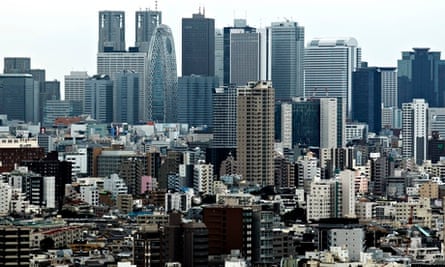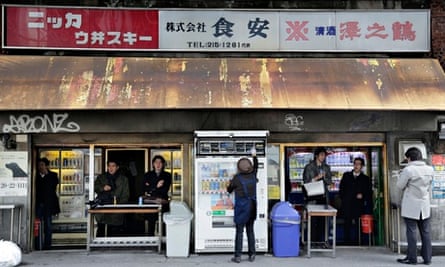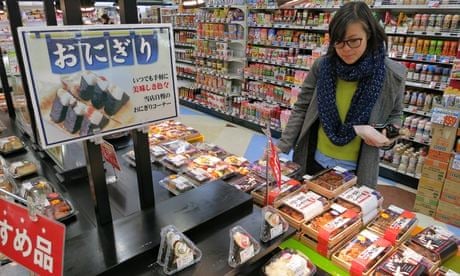It is almost 9pm and a small crowd is building around the sushi section at the Foodium supermarket in Sangenjaya, an affluent district near downtown Tokyo. A clerk makes his way through the gathering with a tagging gun and, as he gets to work, the shoppers fall on the bargains.
"I'd be lying if I said I hadn't been waiting around for this," laughs thirtysomething childcare worker Mayu Ishikawa. She scoops up two trays of sushi marked 50% off in the evening sale – a regular feature at supermarkets across the city. The cost of dinner for her and her boyfriend comes to less than 500 yen (£2.95).
"I don't usually hang around for the bargains, but it doesn't hurt to be careful with money when you live in Tokyo. I moved here a few years ago when I wanted to be in a fun part of town and I didn't mind so much about the expenses. But now we're thinking of moving farther out, beyond Tokyo. We could easily get a bigger place for less."
In what has become a predictable annual announcement, the Economist Intelligence Unit last year declared the Japanese capital to be the most expensive city on the planet. Its calculation, based on the weighted average of the cost of 160 goods and services, has put Tokyo at the top of the ranking for 14 of the past 20 years. While the yardstick offers some insight into life in the metropolis, it perpetuates skewed notions left over from the 1980s, when a domestic spending spree created an economic mirage, sent prices sky high, and frightened off many foreign visitors.
Prolonged deflation and falling wages long ago convinced Tokyo residents to forgo conspicuous consumption for a more prudent lifestyle. To cater to their penny-pinching approach, chains of enormously successful discount retailers sprang up, persuading people to spend less and, in turn, driving the cycle of deflation.
Tenants pay a premium to live in the capital – a monthly average ¥3,124 (£18.50) per square metre over 55 square metres, or about 42% of wages for a typical, single-income household. But they must dig deeper for their onerous annual ward taxes – and, because the Fukushima disaster prompted a shutdown of all 50 nuclear reactors across the country, they are also paying more than ¥8,000 a month in household electricity bills.

"It's true that prices for some things in Tokyo are still expensive," says interior designer Ako Miura, "but the real problem for people who live here is how much they get paid." The 30-year-old recently returned to the city where she lived as a child after a long stint in Melbourne (number five on the Economist's list last year). She was thrilled to land a position at an architecture firm that handles major commercial projects across the city, less so when she found out what she would be earning.
"The first three months, they put me on this trial period which is just ¥200,000 (£1,183) [a month]," she says. Since then her pay has gone up to ¥280,000, about two-thirds of her earnings in Melbourne, and still some way off the record-low average monthly earnings of ¥314,150 for Japanese workers in 2013.
"I couldn't say no," says Miura, who usually puts in 11-hour days at the office and gets home after 9pm. "And anyway, I've heard that in the architecture field, our company actually pays generously compared with lots of other companies, which shocks me a bit. Young people in Tokyo earn really bad money."
So meagre are their earnings that half of Japanese between 20 and 34 live with their parents, convinced they do not make enough to support an independent lifestyle. Since peaking in 1997, salaries across all age groups have fallen by 15%. Prime Minister Shinzo Abe has implored companies to share a recent surge in profits with their staff, but most are reluctant.
Harumi Taguchi, principal economist at IHS Global Insight in Tokyo, forecasts that wages will rise by just 1% this year, while inflation will increase by 2.7%. A consumption tax increase in April – from 5 to 8% – is also causing anxiety among shoppers.

"I can understand why people are cautious," says Miura, who opted for a cheap lease on a 39-square-metre apartment in Shimokitazawa, a lively neighbourhood of bars, galleries and thrift shops popular with students and young professionals. With her boyfriend, she pays just ¥84,000 a month – well below the average for the neighbourhood – but only because the apartment block went up in 1974, several years before building regulations incorporated the latest earthquake safety guidelines. They signed the contract over the loud protestations of Miura's sister-in-law, the guarantor.
While her boyfriend looked for work, Miura supported them both on her trial wage. She gave up eating out altogether and also cosmetics for a while, and she and her boyfriend restricted themselves to discount clothing chains, such as the hugely popular "non-label" labels Uniqlo and Muji. Uniqlo, in particular, has enjoyed a stratospheric rise, driven by the universal appeal of its basic range.
"Winter was coming, so we were a bit anxious," says Miura. "Without Uniqlo, I don't think my boyfriend would have survived. He's okay that he's got a job now, but back then the temperature was falling every day and he had to buy this Heattech stuff, which provides extra warmth. It's cheap to start with, but Uniqlo discounts every weekend – it's crazy." She pauses to think, then says: "Actually, I think all his clothes are either Muji or Uniqlo."
Bargains are not limited to clothing stores. Celebrated Michelin-starred restaurants might charge upwards of ¥20,000 (£118) for dinner, but across the Japanese capital, beef-bowl chains are engaged in a neverending price war, some offering meals for as little as ¥300. Bento meals from convenience stores start at about the same price. And more extravagant lunches include two or three courses for just ¥1,000.
Miura concedes that she and her boyfriend are "picky" about food. "Now that we both have jobs, we sometimes eat out. In Melbourne, we could occasionally afford to go somewhere really nice for special occasions, but here we can't do that."
The cost of some discretionary purchases in Tokyo is more sobering. A trip to the cinema starts at ¥1,800 (£10.60) and, from April, taxis will charge ¥730 before even leaving the rank. But Miura sticks to the city's famously reliable rail network because of a system under which most Japanese companies cover the commuting costs of their full-time staff.
"Every little bit helps," she says. "It was a big stress when we moved here, but we survived and that surprised me. I thought okay, you can live supercheap here if you want, but I don't want to be back to student life again. That's the thing about Tokyo. You can get by on very little – if you make sacrifices.






Comments (…)
Sign in or create your Guardian account to join the discussion